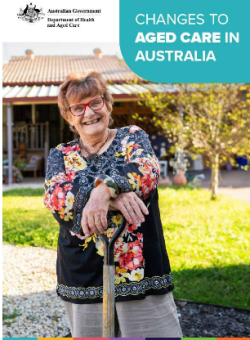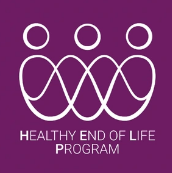
Carer Resources

Aged Care in Australia booklet
A booklet for older people, their carers and families who want to learn more about the changes to Aged Care is available. Find out how to access aged care, read about the latest changes to aged care and learn how to have your say. Download here.
2025 Carer Wellbeing Survey
Carers Australia invite carers to share their experiences in their annual Carer Wellbeing Survey. This year questions about accessing respite care, being a young carer or a carer in a defence family, and life after a caring role ends are included. The survey is confidential and anonymous. Closing date is Friday 18 April. Paper surveys are also available. Access here.
New National Carer Strategy
A new National Carer Strategy was released in December 2024. Unpaid carers are critical to Australia’s future; over 3 million Australians provide care and support to one or more loved ones who live with disabilities, health conditions, addiction, are frail and aged or require palliative care.
Visit your nearest library to learn about aged care changes
The Department of Aged Care has partnered with the Australian Library and Information Association to share information about aged care changes. This partnership is a great opportunity for you to access a range of aged care resources, engage in conversations about aged care and share your insights and feedback. Check this list to see which of your local libraries is participating.
Uber caregiver
Uber Caregiver will allow care recipients to add their carers and support workers directly to the Uber app so they can book rides on behalf of those they assist, using the care receiver’s preferred payment method. It will also allow carers to track the progress of rides and an all-new three-way in-app chat function built especially for Uber Caregiver to ensure open communication between carers, passengers and drivers.
Your local Pharmacist and Pharmacy can support you
The local Pharmacy & Pharmacist are a key part of any community and will be able to assist you with caring for someone who is seriously ill. Learn more. Some pharmacists are accredited to provide a Home Medicines Review and will come to your home and discuss medicines and identify if there are any potential interactions between them and any side effects they may have. You can ask your GP, health specialist or local pharmacist about this service.
Up-skilling Pharmacists on Palliative Care - a National Palliative Care Project. Written by Megan Tremlett, Senior Pharmacist, Pharmaceutical Society of Australia (PSA)
Cheaper Medicines
A freeze on the maximum patient cost of Pharmaceutical Benefits Scheme (PBS) medicines was introduced in January 2025 for one year for everyone with a Medicare card and 5 years for pensioners and other Commonwealth concession card holders. Along with 60-day prescriptions, these changes can help save money and time. Learn more
Safe storage and disposal of medicines
Storage of expired and unwanted medicines in the home can be dangerous and unsafe disposal of unwanted medicines can lead to environmental damage. You can dispose of your unwanted medicines responsibly and for free via your local pharmacy.
FOCUSau study: Evaluating an online support program for people living with advanced cancer and their family carers
People living with cancer are being invited to participate in an NHMRC trial that focuses on improving their quality of life. The FOCUSau program is an online initiative of the University of Melbourne and St Vincent’s Hospital aimed at people with advanced cancer and their main family carer. It aims to improve emotional well-being and quality of life whilst offering coping strategies, future planning advice and symptom management.
National Dementia Helpline
National Dementia Helpline Advisors can provide help when you’re feeling overwhelmed. Call the National Dementia Helpline on 1800 100 500 anytime.
Access My Health Record information on your mobile via my health app
my health app has been developed to help consumers and their carers to be proactive in managing their health. Visit the Apple or Google Play store to download the App and get easy access to key health information in your My Health Record. Learn more.
Where to get support for advance care planning
Visit the Advance Care Planning Australia one-stop shop for a factsheet on the role of free, government-funded services and professional support from GPs or other health practitioners and fee-charging private service providers.
Free Palliative Care information sessions for community groups
Palliative Care Victoria offers free information sessions for community groups on Palliative Care and Advance Care Planning. The sessions are 60 minutes long and can be run with an interpreter if required. A facilitator will travel to a location that is convenient for your group. Download flyer.
Caring for Someone with Cancer booklet
The Cancer Council's updated Caring for Someone with Cancer booklet provides helpful information including practical and emotional support.
Resources for carers of people living with dementia
Dementia Australia has a range of online education sessions and in-person events across Australia for people caring for or supporting someone living with all forms of dementia including Alzheimer’s disease, vascular dementia, Lewy body disease, frontotemporal dementia and younger onset dementia.
Victorian Falls and Balance Service Directory
Search the Victorian Falls and Balance Service Directory to find details of the clinics and programs operated by public hospitals and community health services in Victoria for older people who have had a fall or are at risk of falling.
Continence Aids Payment Scheme (CAPS): Reducing the cost of buying continence products
CAPS is an Australian Government program that provides a payment to people with permanent and severe incontinence to help with some of the costs of buying continence products. You can apply online through MyGov or the Express Medicare mobile app. If applying on behalf of someone else, you should use the paper form. The Continence Foundation of Australia has a list that can help you choose products that may be best for you.
Setting up for at-home palliative care
CareSearch lists practical things to consider, specialised equipment that may be needed or changes in the home with links to useful resources.
Financial Support for Carers
Services Australia has produced a video providing information about the financial support you may be entitled to through the Australian Government. To check your eligibility and get information on each payment visit Services Australia.
The Australian Carers Guide has published Carer Payments Explained which lists the types and amounts of carer payments available and eligibility requirements.
Talking End of Life with people with intellectual disability
A CareSearch resource designed for those supporting someone with an intellectual disability to have conversations about death, grief and loss.
Young Carers Connect
Young Carers Connect (YCC) provides a safe online space for young carers aged 12 to 25 years to connect, find support and engage with peers. With an opportunity to share stories, play games and have a laugh. Register here.

HELP (Healthy End of Life Planning) App
It’s hard to watch a family member or friend you care about deal with the overwhelming challenge of palliative care or end-of-life. You want to help, but don’t always know what they need or when they need it. The HELP App can help you ‘take the lead’ and feel confident in coordinating the practical and emotional support needed when coming to terms with a loved one reaching palliative care or end-of-life. Available from Google Play or the Apple Store.
- Visit the HELP website for more information.
Information for LGBTQI+ Communities
The Cancer Council have updated and improved the LGBTQI+ Communities section on their website to provide a wide range of helpful information tailored to LGBTQI+ people affected by cancer and their carers.
Here for you: Things you might like to discuss with your palliative care team booklets
When your child is diagnosed you may have many questions or concerns when you meet the palliative care team. You may find these booklets helpful to write down your questions or topics you may wish to discuss with the care team.
The Office of the Public Advocate (OPA) information sessions
Participate in one of the FREE online information sessions that cover topics such as Enduring Powers of Attorney, Medical Treatment Decision-Making and Guardianship and Administration on a rotating schedule. Sessions run on Tuesdays at 10 am; no need to RSVP - just join on the day.

Dignified and Respectful Decisions resource
EMRPCC is pleased to partner with Palliative Care Victoria on the Dignified and Respectful Decisions project to empower and educate families to be better prepared for their role as decision-makers and to have collaborative conversations with their aged care team. The initiative supports decision-makers in understanding their role better, being prepared for what’s next and navigating conversations around caring for loved ones who no longer have the ability to make their own decisions.
Palliative Care Victoria's Dignified and Respectful Decisions multi-lingual resources are designed to support family members caring for a loved one in residential aged care.
Support for Carers Program
FREE Service
Unpaid carers provide care and support for their partners, friends, family members or other loved ones with a disability, mental illness, chronic illness or medical condition, terminal illness or ageing-related support needs. The Victorian Support for Carers Program (SCP) can assist by providing tailored, flexible support based on a carer's individual needs and circumstances.

Support Group for carers of residential aged care residents
The Swinburne Wellbeing Clinic for Older Adults offers a support group program for aged care residents' family members and significant others. The group program provides participants the opportunity to meet with others in a similar situation, to exchange ideas, to learn about dementia, depression and anxiety, and to share ways of living with the experience of being a carer.
To participate or learn more about this program, please email Wellbeingclinic_agedcare@swin.edu.au or call (03) 9214 3371.
Neurodiversity and grief: unique challenges of a universal experience
We all deal with grief in different ways. Factors such as culture, society, religion, personal beliefs and past experiences all shape the way we grieve. Another often overlooked factor that influences our response to grief is how our brain works. While research into this area is limited, there are distinct ways that neurodivergent people process grief.
Carer Resources Links
CarerHelp provides information and resources for Australians who are caring for a family member or friend who has a serious illness and is at the end of life. See information for:
Carers Australia is the national peak body representing Australia’s unpaid carers. Advocates on behalf of carers to influence policies and services at a national level and works to improve the health, wellbeing, resilience and financial security of carers and to ensure that caring is a responsibility that’s shared by family, community and government.
CarerHelp Diversity focuses on improving access and reach for diverse populations of Australian carers and is developing resources for culturally and linguistically diverse communities, Aboriginal and Torres Strait Islander peoples, and people who identify as LGBTIQ+.
Carer Gateway is an Australian Government program designed to provide free services and support for carers, including assistance with specific support programs and respite - both planned or emergency.
Healthy End of Life Program (HELP) This App can assist you to ‘take the lead’ and feel confident in coordinating the practical and emotional support that your family needs as they come to terms with a loved one reaching palliative care or end-of-life. Visit the Apple or Google Play store and search for 'Healthy End of Life Program' to download the Free app.
Palliative Care Victoria Provides comprehensive information about Palliative Care for the community, including downloadable audio and written materials in 17 languages.
The Centre for Palliative Care Provides access to education, books and research articles for carers, community and clinicians. Easy English resources.
End-of-life and palliative care for people living with a disability Better Health Channel factsheet that provides a snapshot of key considerations.
